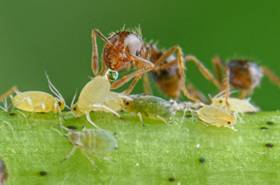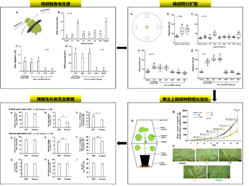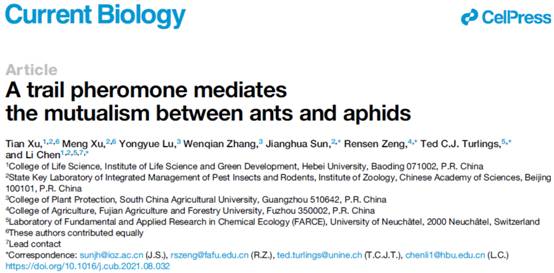Professor Chen Li's Team Discovered a Pheromone That Mediates the Mutualism Between Ants and Aphids
Ant-aphid mutualism is a very common natural phenomenon. The aphids excrete honeydew to provide food for the ants, while the ants provide protection for the aphids to prevent the aphids from being attacked by natural enemies. When the number of aphids exceeds the load of the host plant, the aphids will directly migrate to neighboring plants, or produce winged aphids for long-distance migration. The migration of aphids will inevitably lead to the reduction or disappearance of honeydew resources, so ants must have effective strategies to ensure sufficient honeydew resources. The team of Professor Chen Li from the College of Life Science of HBU found that in the red fire ant-the cotton aphid mutualism system, the trail pheromone of the red fire ant can be sensed by the mutualistic cotton aphids and inhibit the spread of the cotton aphids. On cotton plants, the number of offspring of cotton aphids exposed to the trail pheromone environment has increased significantly, leading to a significant increase in population growth. Trail pheromone brings more benefits to both the mutualistic ants and aphids, which helps maintain or even enhance the mutualistic relationship between ants and aphids. For the first time, the research found that the pheromone of one species can regulate the reproductive behavior of another species, and for the first time revealed the role of ant trail pheromone in the ant-aphid mutualism.


On September 7, 2021, the research findings were published online in the well-known biology journal Current Biology in the form of “Article”. Paper link:
https://www.sciencedirect.com/science/article/abs/pii/S0960982221011362.
HBU is the first completion unit. Professor Chen Li from the College of Life Science is the main corresponding author. Researcher Sun Jianghua from the Institute of Zoology, Chinese Academy of Sciences, Professor Zeng Rensen from Fujian Agriculture and Forestry University, and Professor Ted C.J. Turlings from the University of Neuchâtel in Switzerland are the co-corresponding authors. Xu Tian and Xu Meng are the co-first authors. This research was funded by the General Program of the National Natural Science Foundation, the Basic Science Center Program of the National Natural Science Foundation, and the High-Level Talents Scientific Research Start-Up Program of HBU. The magazine also invited Professor Duur K. Aanen, a well-known entomologist from Wageningen University & Research (WUR) in the Netherlands, to write a dispatch article “Evolution: Ant-aphid mutualism and the early stages of animal husbandry” for it.
